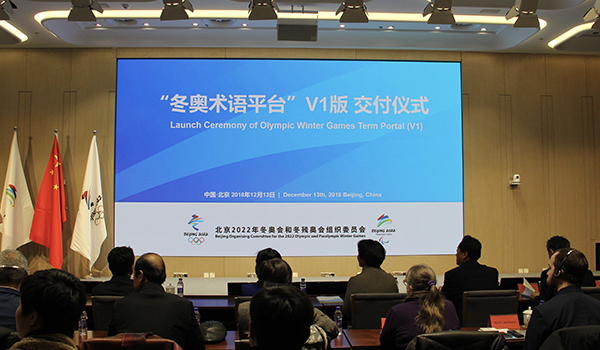On the morning of December 13, 2018, the delivery ceremony of the Olympic Winter Games Term Portal (Version 1) to BOCOG (Beijing Organizing Committee for the 2022 Olympic and Paralympic Winter Games) was held in BOCOG’s Multi-Functional Hall. This marks the formal delivery to put it into use the initial achievement of the Olympic Winter Games Term Portal Project, developed by ACLR, BLCU, with highest accuracy and most languages.

Han Zirong, Secretary-General of the BOCOG, Tian Lixin, Director of the Department of Language Application and Administration of Ministry of Education, and Ni Haidong, Chairman of the Council of BLCU, attended the delivery ceremony and made speeches. Prof. Liu Heping, Manager of the Olympic Winter Games Term Portal Project, Prof. Yang Erhong, Executive Deputy Director of ACLR, and members of Experts Panel of the Project were also present at the ceremony. The ceremony was chaired by Liu Yang, Head of the International Relations Department of BOCOG.
At the ceremony, Ni Haidong delivered to Han Zirong the Chinese-English-French Manuals for Users of the Olympic Winter Games Term Portal. Then, he launched the ceremony together with Han Zirong, and Tian Lixin.

The Olympic Winter Games Term Portal Project was managed by Prof. Liu Heping from BLCU. An Experts Panel was assembled, with Daniel Glon, an experienced Olympics interpreter, as the Chief Expert. The Experts Panel includes 11 senior experts on Olympics language services from China, the United States, South Korea, Japan, Russia, Spain and other countries. The Project has witnessed fruitful outcomes: 2997 terms of the core events in the Winter Olympic Games, 21514 Chinese terms, 32153 English terms, 16520 French terms, 13527 Russian terms have been collected. By the end of 2019, the Term Portal Version 2.0 will have completed to ensure that the Chinese-English-French terminologies are paralleled. At the end of 2021, the Term Portal Version 3.0 will be constructed, and one term with six languages will be searched in Chinese, English, French, Japanese, Korean and Russian.
The data of the Project will be shared by related stakeholders. This is an innovative model in language services for the Olympics, which will be of great benefit to the preparations for the Beijing 2022 Olympic and Paralympic Winter Games.


